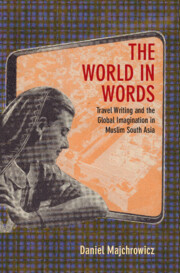‘The World in Words maps with consummate skill the expansive, varied, and immensely popular genre of Urdu travel writing, tracing its development from princely pioneers to pious women, and from earnest seekers of knowledge to playful seekers of pleasure. Sparkling, sophisticated, and immensely readable, this book delights, challenges our assumptions and widens our horizons just as travel accounts did for their Urdu readers.’
Francesca Orsini - Professor Emerita of Hindi and South Asian Literature, SOAS, University of London
‘The World in Words is a stunning book, unearthing a vast world of unknown Urdu print travelogues for the most part produced in barely known localities by largely unknown authors. Others have told the story of an emerging print 'Urdu sphere,' but Majchrowicz’s brilliant analysis of the creation of this modern literary genre adds richly to that story. Urdu travelogues have enthralled readers for a century and more. Majchrowicz’s study of these travelogues will enthrall readers now.’
Barbara Metcalf - Professor Emerita of History, University of California-Davis
‘The World in Words: Travel Writing and the Global Imagination in Muslim South Asia is both a remarkable work of research on adventure storytelling and an adventure in itself. Charting connected histories, fictive kinships, and pluralistic visions of sublime beauty, Daniel Majchrowicz draws new maps of the subcontinent and the world that are dynamic and expansive, yet intimate. This essential guide to the Urdu travelogue hinges on a truth captured by the great Urdu poet Mir: 'sarsarī tum jahāñ se guzre, varnah har jā jahān-e dīgar thā' (You breezed through the world without noticing, but each place was a world of its own). The sheer delight of exploring these worlds with Majchrowicz will lead readers to the ends of the earth and back—with no jet-lag whatsoever.’
Syed Akbar Hyder - Associate Professor of Asian Studies and Islamic Studies, University of Texas at Austin
‘The World in Words demonstrates a bold new route for Urdu studies beyond the overdetermined emphasis on canonical authors; on Urdu’s historical 'homes' in Delhi, Lucknow, and Hyderabad; and on the contexts of colonialism and nationalism for the development of the field. Instead, Majchrowicz shows us a new way forward, provoking us, alongside the texts he translates and analyzes, to develop our own global imaginations for Urdu studies.’
Sara Hakeem Grewal
Source: Journal of URDU Studies



